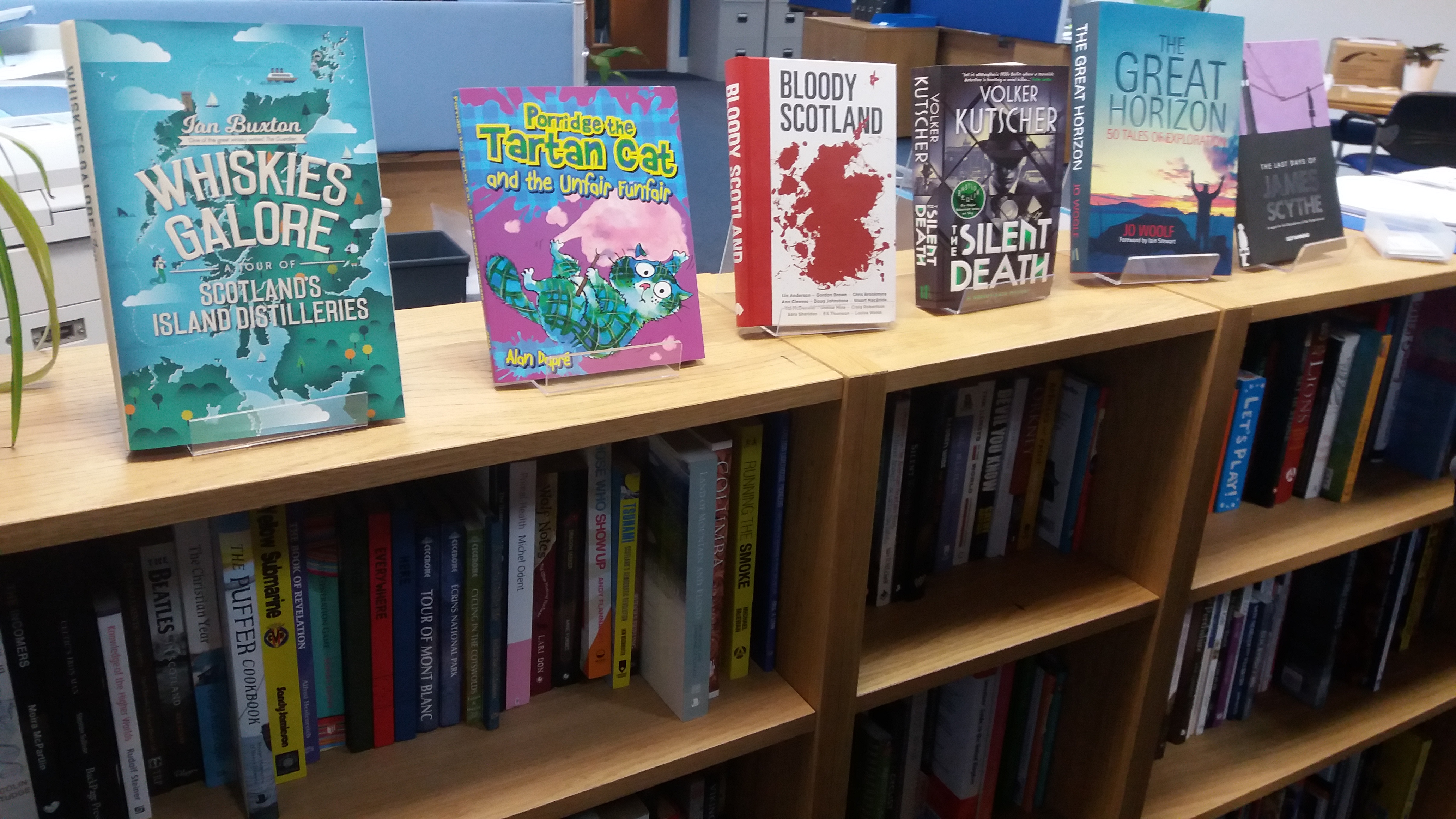Gaelic Books Council scholarship 2018-19 full details
April 25th, 2018 by cs48@stir.ac.uk | Posted in Blog | Comments Off on Gaelic Books Council scholarship 2018-19 full detailsGaelic Books Council Scholarship, 2018-19
April 25th, 2018 by cs48@stir.ac.uk | Posted in Blog | Comments Off on Gaelic Books Council Scholarship, 2018-19 In association with the Gaelic Books Council, we are delighted to announce a scholarship for a student with fluent written and spoken Scottish Gaelic for the MLitt in Publishing Studies, 2018-19.
In association with the Gaelic Books Council, we are delighted to announce a scholarship for a student with fluent written and spoken Scottish Gaelic for the MLitt in Publishing Studies, 2018-19.
For more information, please see the following pdf: GaelicBooksCouncil_Scholarship1819_fps, which include contact details for any queries. The deadline for applications is Friday 18 May 2018.
Glasgow’s Book Festival ‘Aye, Write!’: The Tannahill Lecture
April 5th, 2018 by Ewa Balcerzyk | Posted in Blog | Comments Off on Glasgow’s Book Festival ‘Aye, Write!’: The Tannahill LectureTags: book festivals, culture, Glasgow, lecture
Almost everyone on our publishing course has heard of the Edinburgh International Book Festival, which is due to take place in August. Not everyone, however, knows that Glasgow too has a very ambitious programme of literary celebrations. This year, Glasgow’s Book Festival ‘Aye, Write!’ is taking place between 15 and 25 March. From the impressive programme featuring over 200 authors, what caught my attention was the Tannahill Lecture that was to be delivered by Neil MacGregor, a Glasgow-born author of a forthcoming Penguin book entitled Living with the Gods. Having an academic background of cultural studies, I couldn’t resist the opportunity to listen to an art historian and philosopher give a talk about ‘how different societies have understood and articulated their place in the cosmic scheme’, as advertised in the festival programme.
On the night, I was amazed by the great turnout at the Glasgow Royal Concert Hall, where the lecture was taking place. One couldn’t help but notice, however, that the crowd was primarily one of pensioners. A very gallant elderly gentleman next to me dozed off for most of the talk (although, I must admit, it has happened to me on other occasions, despite the age difference). Nevertheless, I was happy to see that many people showing interest in a bookish and slightly academic event.
As soon as the talk started, I knew at once why so many people have turned up. Neil MacGregor is simply a brilliant speaker, genuinely enthusiastic about discovering as much as possible about human culture and sharing it with the general public. This sense of mission is perhaps not surprising for someone who has for many years run such important public institutions as the National Gallery and the British Museum.
In his lecture, MacGregor touched upon various themes related to the central question of how shared objects and narratives shape communities and help them establish a sense of a common identity. He skilfully presented a very brief, yet thoughtful, run through different emanations of such shared narratives, spanning the whole globe over thousands of years. MacGregor’s cultural references included, among others, the destruction of the Buddhas of Bamiyan, Putin’s orthodox Russia, the Swiss minaret referendum, beliefs of the ancient Romans and Persians, the eternal flame of the French Arc de Triomphe, the story of Our Lady of Guadalupe, and the Epic of Gilgamesh. Using those and many other examples, MacGregor demonstrated how shared religious beliefs have always been the foundation of communities and group solidarity. Common narratives provided people with a sense of cohesion and meaning in their lives.
The scholar ended his lecture on a surprising note. Unexpectedly, he moved on from discussing the images of floods in the Bible and the Epic of Gilgamesh to a cataclysm of our own times – the refugee crisis. MacGregor argued that our world has no global narrative, which would help us to respond better to the plight of refugees. His strong humanitarian message gave us all something to reflect upon long after the lecture.
MacGregor’s book, due in September 2018, explores all the above-mentioned themes in much greater detail. Listeners of BBC Radio 4 may already be familiar with the content, as the publication is based on a radio show of the same title, aired as an impressive 30-part series in 2017 (available as podcasts here).
The Tannahill Lecture marked the beginning of a great festival. The range of topics covered during the events is sure to satisfy all book lovers. From poetry, through Scottish interest, to art, politics, and sport, there is something for everyone. Avid readers can also turn themselves into aspiring writers, as there are nearly 20 different creative writing workshops running for the duration of the festival.
Browsing through the programme, I had only one regret – that I could not afford to attend more author meetings, as most are priced at ₤9, with no student concessions available. Other than that, ‘Aye, Write!’ is definitely doing a great job at developing the local literary scene. Can’t wait for next year!
Ewa Balcerzyk
BookSource
April 5th, 2018 by Ana Tratnik | Posted in Blog | Comments Off on BookSourceTags: BookSource, distribution, mlitt, University of Stirling
 Beginning of the spring semester, time for a field trip to Glasgow! On Monday, 5th February, the Publishing students got to know two aspects of the book process. We visited a distribution company, BookSource, and one of the largest and oldest British printing and binding companies, Bell & Bain. Both were absolutely worth a visit, not only to see what happens with a book when it’s published, but because we all left infected full of enthusiasm radiated from the people who work there.
Beginning of the spring semester, time for a field trip to Glasgow! On Monday, 5th February, the Publishing students got to know two aspects of the book process. We visited a distribution company, BookSource, and one of the largest and oldest British printing and binding companies, Bell & Bain. Both were absolutely worth a visit, not only to see what happens with a book when it’s published, but because we all left infected full of enthusiasm radiated from the people who work there.
When we arrived to the BookSource we were split in two groups. One group visited the well-organised warehouse with pleasant Jim and the other group was welcomed with a presentation by Louise, accompanied with coffee, tea and biscuits.
BookSource was founded in 1995 by Publishing Scotland. With only ten people working there their job is to receive and store books, get them to the market, collect, process and fulfil customer orders, invoice customers and collect cash. Their customers are booksellers, wholesalers, online retailers, supermarkets and private individuals. BookSource used to store more than 7M books, but since publishers have taken the advantage of the print-on-demand service, they are able to save space and the number of books in the warehouse has reduced to 3.44M. Currently, they cooperate with 94 publishers and stock 13,178 live titles, including CDs and maps.
 BookSource distributes books not only to the mainland UK, but also to the Scottish Isles and abroad. Because of the increased traffic, it is cheaper to deliver books abroad, for instance to Germany or Benelux, than to the Isles. On every dispatched box they put a sticker so they can follow it and know where it is at any time, they also get information in case it gets lost and when the customer receives it.
BookSource distributes books not only to the mainland UK, but also to the Scottish Isles and abroad. Because of the increased traffic, it is cheaper to deliver books abroad, for instance to Germany or Benelux, than to the Isles. On every dispatched box they put a sticker so they can follow it and know where it is at any time, they also get information in case it gets lost and when the customer receives it.
They are constantly improving their system, which enables them to be up-to-date with what is happening in the warehouse, e.g. they can see what books are missing, but also what are the extra books they store. Their new developed services are MyBookSource, an online bookshop run by BookSource; DataSource holding descriptions of books which took up to four years to be developed and it provides information for their customers, Nielsen etc; and InfoSource that provides all the information for the sales team and allows publishers to check how their sales are going, discounts, how much cash they have collected, if they should reprint a book …
Some interesting facts to conclude, one of the bestsellers lately and a recommended reading by the BookSource is Poverty Safari by Darren McGarvey, a book about the effects of poverty in Glasgow. The cheapest book, and also a bestseller, that has been stored in the BookSource is Everything Men Know About Women, containing nothing but 32 blank pages, “written” by a woman.
A big thank-you to Louise and Jim for making us welcome. We enjoyed learning about a step of the book production that is not directly linked with the office work in a publishing house, but really, really valuable.

